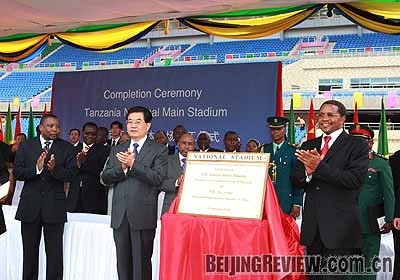|
Against the backdrop of the financial crisis, African countries have high expectations for China, said Xu Weizhong, an expert on African studies at the China Institutes of Contemporary International Relations (CICIR). They not only suffer from decreasing export revenue in the wake of raw material price drops, but also worry about possible decline in international assistance. In this sense, China's pledge to promote trade and investment ties and not to cut assistance is reassuring, he said.
He Wenping, an African affairs expert at the Institute of West Asian and African Studies under the Chinese Academy of Social Sciences, echoed Xu's views. A major challenge for both China and Africa is reduced demand from European and American markets, she said, so it is important for them to expand trade with each other.
In terms of investment, Chinese companies can play a big role in Africa's resources exploitation, infrastructure construction, agriculture and manufacturing industry, she said.
Not just energy
In an interview with Chinese and foreign media in Dar es Salaam, Tanzania, Hu said his African tour was aimed at "cementing friendship, deepening cooperation, dealing with challenges and seeking common development.
"China will fully and punctually implement measures agreed upon at the Beijing Summit of the FOCAC, seek China-Africa pragmatic cooperation and promote the further development of our new strategic partnership," he said.
This was Hu's second tour to Africa since the landmark FOCAC Beijing Summit in 2006. At the summit, he announced eight measures to promote China's ties with Africa, including doubling aid to Africa over a three-year period as well as tariff cuts and debt exemption for poor African countries.
All these measures have been steadily put into practice, Assistant Foreign Minister Zhai Jun said at a press conference shortly before Hu's African trip. Noting that 2009 is the last year for their implementation, he promised that China would completely fulfill them by the end of this year.
For example, the China-Africa Development Fund, proposed by Hu at the FOCAC Beijing Summit, has been launched and has invested in 20 projects to date. The construction of the African Union Conference Center started last December with Chinese funding. By the end of 2008, China had trained 11,000 professionals from African countries, dispatched 125 young volunteers to Africa and selected 100 senior agricultural experts to be sent to Africa.
China-Africa cooperation is based on their mutual needs and benefits both sides, said Xu of the CICIR. For Africa, close ties with China can help it achieve diversity in its diplomatic relations and make itself better heard on the international stage. It can also learn from China's experience in achieving economic takeoff while sharing in its fruits, he said.
China needs Africa's political support as it strives to protect developing countries' interests and foster a more reasonable international political order, Xu said. It also needs Africa's market and resources, he added. He stressed that China stands for mutual benefit in economic cooperation. In Xu's view, China benefits more in normal trade relations with some African countries since it is more developed than they are. As compensation, it gives assistance to these economic partners. He believes China is capable of increasing its assistance to Africa.
At the same time, Xu pointed out that China's economic interest in Africa is not limited to energy; instead, it seeks all-round international economic cooperation.
Zhai noted that none of the four African countries Hu visited is abundant in energy and resources, which he believes shows that energy or resources are not the only focus of the China-Africa relations.
"We enjoy profound traditional friendship and mutually beneficial cooperation with all of the four African countries," he said. "Our cooperation covers various fields."
Agreements Signed During President Hu Jintao's African Tour
China will offer an additional 34 scholarships for Malian students to study in China and help train 65 Malian professionals. It will ensure the completion of 10 women and children's centers and provide medicine and medical facilities for a new malaria treatment center.
China and Mauritius agreed to speed up construction of the Tianli economic and trade cooperation zone. The $750-million project is expected to create jobs for some 34,000 people, while 8,000 will benefit from indirect jobs.
China will help build two agricultural schools in Mauritius and provide additional scholarships to increase the number of Mauritian students in China every year from 45 to 65.
China agreed to lend Mauritius $260 million to expand the nation's airport. The two countries also signed deals on China's extension of an interest-free loan of 40 million yuan ($5.9 million) as well as a 30 million yuan ($4.4 million) grant to Mauritius.
Source: China Daily
Milestones in China-Africa Friendship
May 1956: Egypt becomes the first African country to establish diplomatic relations with China.
Late 1963-early 1964: Chinese Premier Zhou Enlai visits 10 African countries, laying the groundwork for the development of China-Africa relations.
 |
|
FRUIT OF COOPERATION: Chinese President Hu Jintao attends the completion ceremony of the Tanzania National Main Stadium, which was built with Chinese assistance, with Tanzanian President Jakaya Mrisho Kikwete on February 15 (JU PENG) |
1970s: African countries support the People's Republic of China's efforts to restore its legitimate seat at the UN, formerly held by Kuomintang authorities in Taiwan.
| 